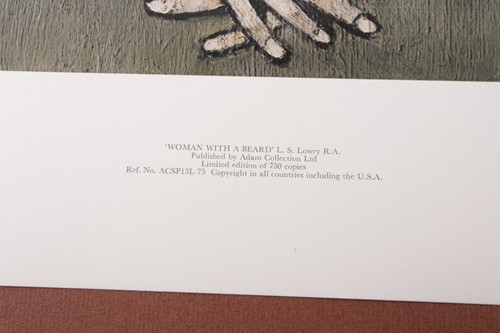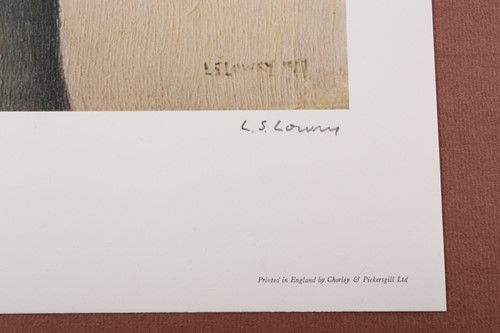25th Nov, 2021 9:30
Fine Art & Antiques
Laurence Stephen Lowry (1887-1976), 'Woman with Beard' limited edition signed lithographic print, 58 cm x 48 cm with margins, Fine Art Trade Guild blindstamp, printed number '747', loose in mount.
Provenance: From the collection of Monty Bloom (See Dawsons website articles for more details)
Extract from 'A COLLECTOR’S LIFE' Monty Bloom and L.S. Lowry © Martin Bloom, 2020' :
One particular painting in that 1957 documentary was purchased by my father, together with the original drawing upon which it is based, and a signed numbered print of it is for sale within Dawsons December sale. Woman with a Beard was based on a bearded woman Lowry met on a train journey to Paddington. Mervyn Levy in his book, The Paintings of L.S. Lowry, sees it as “a succinct example of the artist’s power to express the terrible isolation of the individual soul, an isolation unquestioned and blithely accepted. Everything is concentrated in the face itself, the setting from which we can extricate ourselves only by renunciation of self. Lowry’s imagery is the measure of a common destiny.”
Sold for £1,000
Laurence Stephen Lowry (1887-1976), 'Woman with Beard' limited edition signed lithographic print, 58 cm x 48 cm with margins, Fine Art Trade Guild blindstamp, printed number '747', loose in mount.
ProvenanceProvenance: From the collection of Monty Bloom (See Dawsons website articles for more details)
Extract from 'A COLLECTOR’S LIFE' Monty Bloom and L.S. Lowry © Martin Bloom, 2020' :
One particular painting in that 1957 documentary was purchased by my father, together with the original drawing upon which it is based, and a signed numbered print of it is for sale within Dawsons December sale. Woman with a Beard was based on a bearded woman Lowry met on a train journey to Paddington. Mervyn Levy in his book, The Paintings of L.S. Lowry, sees it as “a succinct example of the artist’s power to express the terrible isolation of the individual soul, an isolation unquestioned and blithely accepted. Everything is concentrated in the face itself, the setting from which we can extricate ourselves only by renunciation of self. Lowry’s imagery is the measure of a common destiny.”




